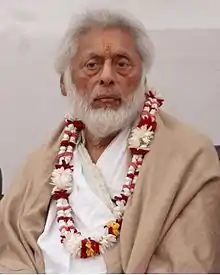Shyam Manohar Goswami
Shyam Manohar Goswami (IAST: Śyāma Manohara Gosvāmī, Hindi: श्याम मनोहर गोस्वामी, Gujarati: શ્યામ મનોહર ગોસ્વામી) also known as Shyamu Bava (IAST: Śyāmu Bāvā, Hindi: श्यामु बावा, Gujarati: શ્યામુ બાવા), is the 16th descendant of Shri Vallabha Acharya, sanskritists, philosopher, spiritual leader, active reformer & guru of the Krishna-centered Pushtimarg sect of Vaishnavism.[1][2][3]
Shyam Manohar Goswami | |
|---|---|
 Shyam Manohar Goswami in 2014 | |
| Personal | |
| Born | 26 June 1940 |
| Religion | Hinduism |
| Nationality | Indian |
| Sect | Pushtimarg |
| Philosophy | Hindu philosophy, Shuddhadvaita, Pushtimarg, Vedanta |
| Residence | VileParle, Mumbai, Maharashtra, India; Kishangarh, Rajasthan, India |
| Part of a series on | |
| Hindu philosophy | |
|---|---|
 | |
| Orthodox | |
|
|
|
| Heterodox | |
|
|
|
Life
Childhood
Shyam Manohar Goswami was born in Mumbai, India. His father Goswami Shri Dikshitji Maharaj was a well renowned Pushtimarg guru, was the 15th descendant of Shri Vallabha Acharya.
Academia & Research

He was the lecturer on Vallabh Vedanta at the 91st session of the Indian philosophical congress held in February 2017 at the Sanchi University of Buddhist-Indic Studies in Madhya Pradesh, India.[4][5]
Pandit Jasraj has done extensive research in Haveli Sangeet under Shyam Manohar Goswami to create numerous innovative bandish (composition).[6]
Bibliography
Shyam Manohar Goswami has written, and continues to write independent works on Pushtimarg theology and philosophy.[7][8][9][10][11] He has also written commentaries on most of Vallabha's works, including all sixteen treatises.[12]
Books
- Mahāprabhu Śrī Vallabhācārya, Sanskrit, 1995
- Puṣṭividhānam, Sanskrit, 1995
- Prasthānaratnākaraḥ, Sanskrit, 1999
- Anyākhyativadya vidvatsaṅgoṣṭhī, Sanskrit, 2002
- ́Srīmadvallabhamahāprabhustotrāṇi, Sanskrit, 2005
- Srīpuruṣottamapratiṣṭhāprakāraḥ, Hindi, 2005
- Adhunik nyāyapraṇālī aura pushṭimārgīya sādhanāpraṇālī kā āpasī ṭakarāva, Hindi, 2006
- Gr̥hasevā aura Vrajalīlā, Hindi, 2006
- Vallabhvedanta nibandha saṅgraha, Hindi, 2006
- Pratyakṣapramā : vidvatsaṅgoṣṭhī, Sanskrit, 2007
- Vādāvalī : Brahmavādapramukhānām anekavādānāṃ saṅkalanarūpa, Sanskrit, 2008
- Viśodhanikā, Hindi, 2008
- Brahmavāda : Vādāvalī sampādakīya, Hindi, 2008
- Pushti Siddhant Achariya Sabha, Gujarati, 1992
- Balkrishna Granthvali, Gujarati, 1999
- Bhagvatseva no Suddh Prakar, Gujarati, Hindu Samvatsara 2050
- Seva kaumudi, Hindi, Hindu Samvatsara 2064
- Pushti Bhakti Tatha Sharnagati Mai Fal, Hindu Samvatsara 2068
- Purusharth Vyavastha – Dharm Arth Kaam Moksh, Hindi, Hindu Samvatsara 2068
- Anubhashya nu Adhyayan, Hindi, Hindu Samvatsara 2068
- Navratna Updesh Manas Shastriya Vishleshan, Hindi, Hindu Samvatsara 2069
- Ahankar Mimamsa, Hindi, Hindu Samvatsara 2070
- Ahankar Mimamsa Dwitiya, Hindi, Hindu Samvatsara 2070
- Kapil Geeta Anubhashya, Gujarati, Hindu Samvatsara 2070
- Lagu Granth Sangraha, Hindi, Hindu Samvatsara 2070
- Geeta Sankshep, Gujarati, Hindu Samvatsara 2072
- Sharnagati Vichargosthi, Gujarati
- Ras Drashti ni Tarfenma, Gujarati
- Pushtimargiya Peethadheesh, Gujarati
- Amrit Nu Achman, Gujarati
- Dharm Arth Kaam Moksh ni Pushtimargiya Vivechana, Gujarati
- Bhakti Vardhini Keshod Pravachan Ansh, Gujarati
- Bhaktivardhini Vakhyata, Gujarati
- Chirkut Charcha Samiksha, Hindi
- Dharm Arth Kaam Moksh ki Pushtimargiya Vivechana, Hindi
- Shri Damodardasji – Shri Krushnadas Meghanji – Vaarta Vivechan, Hindi
- Paschimi Darshan Rooprekha, Hindi
- Siddhantvachanavali Gurjar Bhasha Bhavanuvad Sahit, Gujarati
- Amrut Vachanavali, Gujarati
Articles
Book Edits
References
- "Shyamdas Recognized in Pushti Publication". shyamdasfoundation.com. Shyamdasfoundation. Retrieved 17 June 2017.
- Sahoo, Ajaya Kumar (28 February 2014). Indian Transnationalism Online: New Perspectives on Diaspora. Ashgate (28 February 2014). p. 233. ISBN 978-1472419132.
- A Storm of Songs (Harvard University Press, 2015 ed.). Acknowledgements: Harvard University Press. 2015. ISBN 9780674425286.
- "91st Session of Indian philosophy Congress" (PDF). indianphilosophicalcongress. Retrieved 25 July 2017.
- "Day 2 News – 91st Session of Indian philosophy Congress" (PDF). sanchiuniv.org.in. Sanchi University. Retrieved 25 July 2017.
- "A custom of culture". The Hindu. No. Online edition of India's National Newspaper. 1 December 2004. Archived from the original on 6 November 2018. Retrieved 25 July 2017.
- "Shri Shyammanoharji Granths". pushtimarg.net. Retrieved 17 June 2017.
- "Articles". pushtisahitya.org. Retrieved 17 June 2017.
- "National Seminar". jnanapravaha.org. Retrieved 17 June 2017.
- The Bhagavata Purana: Sacred Text and Living Tradition. Columbia University Press (19 March 2013). 19 March 2013. p. 263. ISBN 978-0231149990.
- Kumar, Shashiprabha (2006). Veda as word (2006 ed.). Special Centre For Sanskrit Studies & D. K. Printworld (2006). p. 42. ISBN 8124603766.
- Sharma, Shital (August 2006). Restoring Ananda: Philosophy, Aesthetic Experience, and Ritual in Pushtimarga Vaishnavism (PDF). Canada: Faculty of Religious Studies McGill University, Montreal. p. 76. ISBN 978-0-494-32561-2. Retrieved 25 July 2017.
- "Jain Library: Multiplex Concepts of Yoga" (PDF). jainlibrary.org. Jain Library. Retrieved 25 July 2017.
- "Avataravadavali". nationallibrary.gov.in. Kolhapur : Vaibhav Cooperative Society, 2004. Retrieved 25 July 2017.
- "Pustividhanam". nationallibrary.gov.in. Bombay : Sahayoga Prakashan, 1996. Retrieved 25 July 2017.